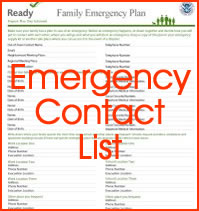- HOME
- Survival Skills
- Emergency Communications Plan
How To Create An Emergency Communications Plan

I grew up in a time when home phones and pay phones were everywhere. (I know - I'm older than you.)
There was no Internet and certainly no cell phones. If someone wanted to call you, they called from their home phone or pay phone and hoped you were home.
We had everyone's phone number memorized - everyone we called regularly, at least.
Invest in emergency food storage now and enjoy peace of mind for the next 25 years. Don't miss out on the savings!
Where do we keep our most-called phone numbers now? In our cell phones, of course. Even my home phone has programmable number keys.
So what would happen in a catastrophe if we needed to contact a loved one? Chances are — we couldn't. During some fairly recent disasters (9/11, Katrina, Sandy, Japan's tsunami), phone lines were so overloaded that local calls could not be completed. Interestingly, most long distance calls still went through.
The lesson here is to have contacts who are a long distance call away to be the point person where all family members report their whereabouts. Often in disaster situations, calls will not go through at all, but text messages will.
Suggestion:
Write/type your important information and contact numbers on a business card. Carry it with you and memorize the information on it. Print it out on water resistant stock if possible or laminate it. Do this as quickly as you can. The numbers in your cell may not always be available to you.
Now is the time to plan how your family will stay in contact if separated because of some kind of disaster. Gather the family together to discuss and plan how you will all keep in touch, IF a crisis occurs.
- What will each family member do if you're not at home?
- Where can you meet? How will you contact each other?
- Do you know your neighbors well enough to feel safe with them?
- What if cell phones don't work? What if land lines don't work?
These are the questions that should be asked, and then answered. Write down the answers in your emergency contact plan.
Pick two meeting places:
- Choose a location a safe distance from your home in case of fire.
- Choose a place outside your neighborhood in case you can't return home.
Items to Prepare in Advance of a Crisis:
- Stock supplies to last several days to a week for each family member. (This, of course, is the purpose of a 72-hour kit and your emergency food storage.)
- Be prepared to relocate to a shelter during a prolonged power outage. If the crisis doesn't involve destruction of your home, stay in your home and, hopefully, you have prepared for lighting, cooking, and keeping warm without electricity.
- Have extra cash on hand in case electronic transactions (ATM card, credit cards, etc.) cannot be processed. Having a safe (small or large) in your home is always a good idea.
- Talk with your family about every crisis scenario you can think of and the steps each needs to take to be ready if a disaster happens.
Meet with Neighbors
Do you have a Neighborhood Watch Program organized in your neighborhood? If you do, hold a meeting to plan how the neighborhood could work together after a disaster. Know your neighbors' skills (medical, technical). Consider how you could help neighbors who have special needs, such as elderly or disabled persons. Make plans for child care in case parents can't get home.
Establish an Out-Of-State 24-Hour Telephone Contact
- Calls out will not overload phone lines as much as calls coming into a disaster area.
- All relatives should be informed now on procedures to call the phone contact, not after a disaster has occurred. Individual location and status should be requested.
- Take color pictures of every room plus pictures of valuables. Send one copy of legal papers and one copy of pictures to an out-of-state contact.
Information about using cell phones and land lines during a crisis:
- Charge cell phones and extra batteries before predicted storms hit.
- Consider using a car charger for cell phones.
- Text message or email instead of calling on cell phones to help alleviate network overuse.
- Send short text messages on cell phones. They are more likely to go through and will stay in queue until they can be sent.
- Wait 10 seconds before redialing on cell phones to allow networks time to clear data.
- Save cell phone batteries by using working land lines.
- Use walkie talkies to communicate short distances.
- Make calls only in an emergency to keep lines and networks as free as possible.
- Remember land line cordless phones don’t work during a power outage.
- Sometimes cell phones will not work during an extended power outage.
- Keep phones and batteries dry.
- Have more than one method of communication such as land lines, cell phones, cable, internet, and electricity can all be disrupted and at different times.
- If you evacuate, forward home numbers to cell phones.
- Program emergency contacts into cell phones.
- Have a central contact outside the storm area so family and/or friends can check in if they become separated from your group.
So what do we do right now?

Download this form, Family Emergency Contacts Plan (PDF format), to use for keeping all your emergency contacts in one place. Fill it out and put it in your family planner binder.
Or download this Excel version to fill in on your computer.
Family Emergency Contacts Plan (Excel format - zipped)
Your emergency contact plan and list is one of the MOST important tasks you can complete for your family's safety in a real disaster.

Your Family Documents Emergency Planner - Your family emergency planner should include emergency contacts, copies of insurance policies, deeds, licenses, credit cards — basically all your important paperwork, where the originals are located, and who to contact in case of a catastrophe or death.
It should also include all the necessary forms for keeping track of your food storage and other supplies.
Emergency Radios - When there is no electricity, no cell phone service, no Internet connection, an emergency radio would be a good thing to have to keep in contact with the outside world.
It should have more than one power source: electric, solar, wind up, and battery. There are radios with several bands: AM, FM, weather, and short wave. The prices range from reasonable to expensive depending on how many functions it may have.
What do you think?
I’d love to hear what you have to say in the comments.
















